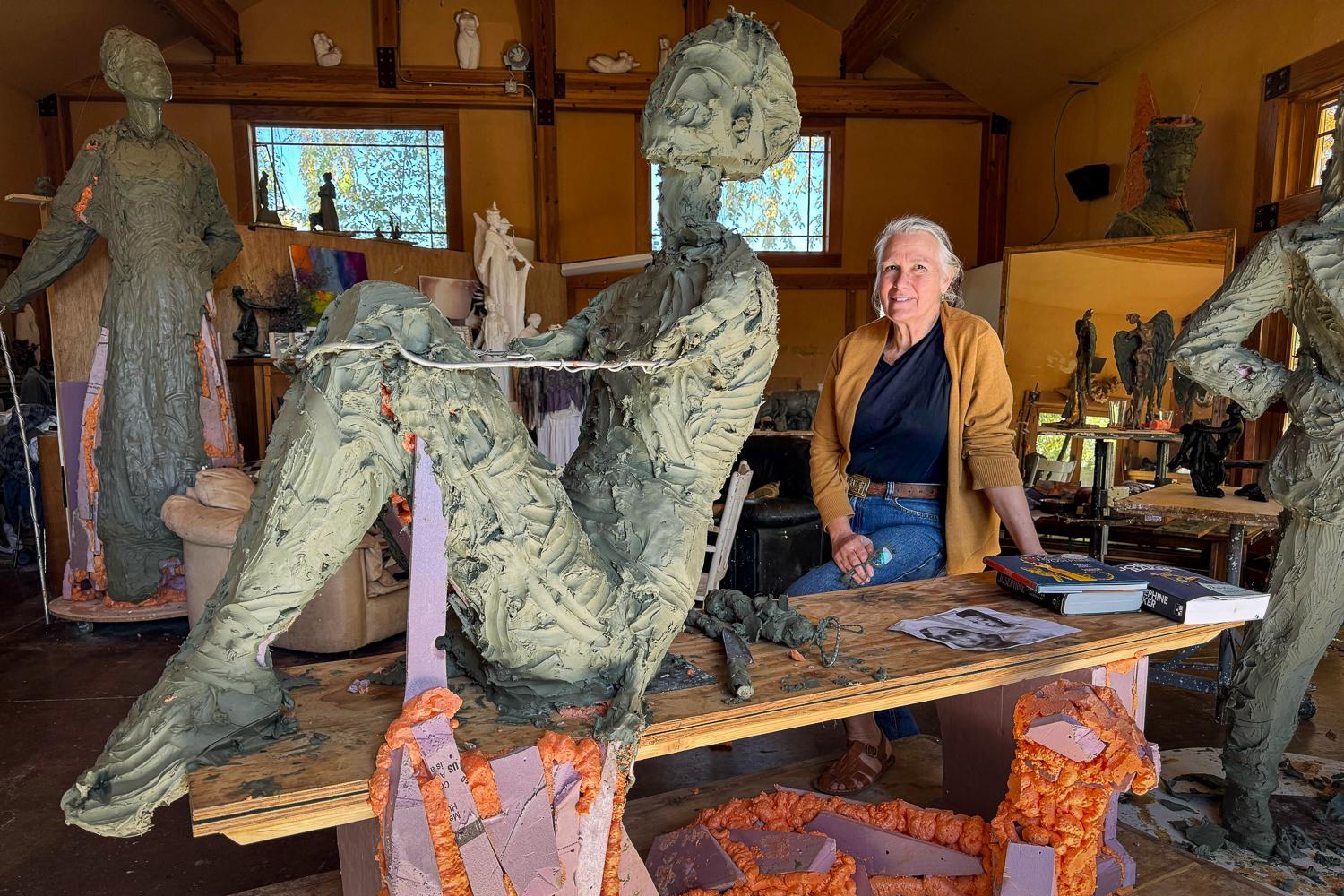
By Tom Huizenga | NPR
At age 60, four decades into her career, Mexican composer Gabriela Ortiz has arrived. Last year she released Revolución Diamantina, a breathtaking album recorded by the Los Angeles Philharmonic and conductor Gustavo Dudamel. It won Ortiz three Grammys in February.
Now, the same forces return for Yanga, another arresting recording of Ortiz's orchestral music that showcases her signature bright colors, vivacious rhythms, tuneful melodies and bold ideas. The album is so good it just might deliver a few more awards to her shelf.
The anchoring work on Yanga is a new cello concerto tailor made for Alisa Weilerstein, who premiered the piece last fall and plays it here with fearless conviction. The concerto's title, Dzonot, is the Mayan word for the vast underground caves and cisterns found in Mexico's verdant Yucatán Peninsula. In the opening movement, "Luz Vertical," you can hear the moment when a shaft of light strikes deep into a cave, glittering on the water, thanks to Ortiz's translucent combination of winds dancing with harp, piano, celesta and the ping of crotales.
In Dzonot, Ortiz illustrates the vibrancy of the Yucatán's natural splendor, but also the threat it faces from tourist development. In the movement titled "Jade," a menacing orchestra roils mechanically, like a machine gobbling up the landscape. In "El Ojo del Jaguar," an homage to the endangered Mexican jaguar, the rhythms are lither. Ortiz breaks out head-bobbing grooves, utilizing some of the 29 percussion instruments in the score, while instructing Weilerstein to whip up cyclones of jagged bow strokes.
In the best of all possible worlds, Dzonot would quickly enter the cello concerto repertoire. But like much of Ortiz's recent orchestral music, it's not a simple score to pull off. Still, an increasing number of Ortiz's nearly 100 compositions are receiving performances as she finally gets long overdue visibility. She just finished a season as Carnegie Hall's resident composer and has moved on to the same position at the Concertgebouw in Amsterdam. It also helps to have champions of your music. Ortiz has these fabulously intuitive performances led by star conductor Dudamel, who describes her as one of the most talented composers in the world.
Growing up in Mexico City, Ortiz was surrounded by folk music. Her parents played in the celebrated Latin American band Los Folkloristas, which frequently held rehearsals in their basement filled with folk instruments. Ortiz pays homage to the music on the new album, specifically to Violeta Parra, who pioneered the socially conscious "Nueva Canción" movement and died by her own hand in 1967. Six Pieces for Violeta brings out a more somber side of Ortiz. The opening movement, "Preludio Andino," begins with a meandering piano, braided with mysterious strings. "Canto del Agelito" unfolds a Bartok-flavored theme for violin and unnerving, shifting strings, while a low, tolling piano haunts "Amen," the final section.

If Dzonot is concerned with Mexico's biodiversity, Yanga, the title track, engages with the country's cultural history. The work tells the story of Gaspar Yanga, a real life 16th century African prince brought to Mexico as a slave. After his escape, Yanga spent 30 years as a fugitive and a preeminent Robin Hood figure who finally became, as Ortiz puts it in the album liner notes, "the first Black ruler in America."
The work is a show-stopping spectacle for the Los Angeles Philharmonic, the Mexican percussion ensemble Tambuco and the Los Angeles Master Chorale, who sings both in Spanish and a dialect from the Congo. Ortiz exploits the chorus almost as another percussion instrument, trading polyrhythmic beats with the Tambuco players on a variety of Afro-Latin instruments including batá drums, shekeres, caxixi and guiros.
This music, for Ortiz, is a shoutout to equality and freedom, ideas the composer knows well, having earned her hard-won success. With this outstanding new album, and the Grammy winner from last year, it's time for the world to finally catch up to the extraordinary music of Gabriela Ortiz.
Copyright © 2025 NPR
Transcript:
JUANA SUMMERS, HOST:
Mexican composer Gabriela Ortiz has arrived.
(SOUNDBITE OF THE LOS ANGELES PHILHARMONIC'S PERFORMANCE OF GABRIELA ORTIZ'S "KAUYUMARI")
SUMMERS: This music is from an album last year, featuring the Los Angeles Philharmonic and conductor Gustavo Dudamel. It won Gabriela Ortiz three Grammy awards. Now, the same forces are back with a new album titled "Yanga." Our reviewer, NPR's Tom Huizenga, has been listening, and he is thrilled.
TOM HUIZENGA, BYLINE: If you want bright colors, vivacious rhythms, tuneful melodies and bold ideas, Gabriela Ortiz has you covered.
(SOUNDBITE OF ALISA WEILERSTEIN AND THE LOS ANGELES PHILHARMONIC'S PERFORMANCE OF GABRIELA ORTIZ'S "DZONOT: IV. EL VUELO DE TOH")
HUIZENGA: That's from "Dzonot," a new cello concerto, the anchoring work on the album and tailor-made for cellist Alisa Weilerstein, who plays the work with fearless conviction. The title, "Dzonot," is the Mayan word for the vast underground caves and cisterns found in Mexico's Yucatan Peninsula. In the opening movement, "Luz Vertical," you can hear the moment when a shaft of light strikes deep into a cave, glittering on the water.
(SOUNDBITE OF ALISA WEILERSTEIN AND THE LOS ANGELES PHILHARMONIC'S PERFORMANCE OF GABRIELA ORTIZ'S "DZONOT: I. LUZ VERTICAL")
HUIZENGA: At age 60, Ortiz is finally getting richly deserved recognition. She just finished a season as Carnegie Hall's resident composer. And it helps to have champions of your music. Ortiz has these fabulously intuitive performances, led by star conductor Gustavo Dudamel. He calls Ortiz one of the most talented composers in the world.
(SOUNDBITE OF ALISA WEILERSTEIN AND THE LOS ANGELES PHILHARMONIC'S PERFORMANCE OF GABRIELA ORTIZ'S "DZONOT: II. EL OLO DEL JAGUAR")
HUIZENGA: You can hear what preoccupies Ortiz in this cello concerto. She's worried about the delicate Yucatan region and, in this section, the endangered jaguar. Ortiz breaks out a groove with some of the 29 percussion instruments in the score right after Weilerstein unleashes a cyclone.
(SOUNDBITE OF ALISA WEILERSTEIN AND THE LOS ANGELES PHILHARMONIC'S PERFORMANCE OF GABRIELA ORTIZ'S "DZONOT: II. EL OLO DEL JAGUAR")
HUIZENGA: Ortiz grew up on folk music. Her parents played in the celebrated Latin American band, Los Folkloristas. And on the new album, Ortiz pays homage to the music, especially to Violeta Parra, a pioneer of the socially conscious song movement in the 1960s. "Six Pieces For Violeta" begins with a meandering piano braided with mysterious strings.
(SOUNDBITE OF JOANNE PEARCE MARTIN AND THE LOS ANGELES PHILHARMONIC'S PERFORMANCE OF GABRIELA ORTIZ'S "SEIS PIEZAS A VIOLETA")
HUIZENGA: The title track on "Yanga" tells the story of Gaspar Yanga. He was a 16th century African prince enslaved in Mexico. He becomes a fugitive, a Robin Hood figure and finally, as Ortiz puts it, the first Black ruler in America. It's a showstopping spectacle for orchestra, percussion and chorus.
(SOUNDBITE OF LOS ANGELES MASTER CHORALE AND THE LOS ANGELES PHILHARMONIC ET AL.'S PERFORMANCE OF GABRIELA ORTIZ'S "YANGA")
LOS ANGELES MASTER CHORALE: (Singing in non-English language).
HUIZENGA: This music, for Ortiz, is a shoutout to equality and freedom, ideas the composer knows well, having earned her hard-won success. With this album and the Grammy winner from last year, the world is finally catching up to the extraordinary music of Gabriela Ortiz.
SUMMERS: The album is "Yanga" by Gabriela Ortiz. Our reviewer is NPR's Tom Huizenga.









